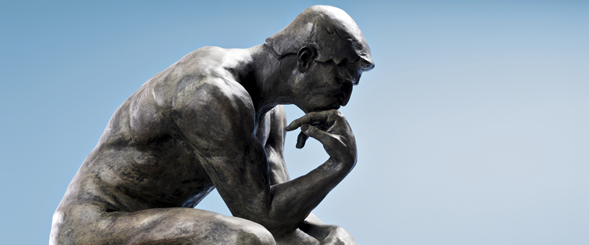Think Big
Three philosophy majors apply their degrees in diverse ways.

On internet news sites and in daily newspapers alike, the same old headlines resurface at this time of year.
The 10 most lucrative college degrees
America’s 10 best paying professions
It’s a good bet philosophy isn’t on either of these lists.
“"I knew ... when I declared my major, that it was random for a football player."”
As legislators, business professionals and even higher education officials increasingly promote careers in science and math, universities continue to offer degrees in the humanities, and many students still choose to major in the “softer” disciplines such as English, religious studies and philosophy.
But what do you do with a degree in philosophy?
Three San Diego State graduates have come up with surprisingly different answers.
Radical goals
For Jessica Davis, philosophy is a tool to change education. Her fledgling Ideal School Foundation promotes the creation of philosophy-based charter high schools that encourage clear, critical thinking and dialogue regarding topics such as meaning, value and justice.
Davis had a difficult time in high school, although testing identified her as gifted. “It bothered me that a certain percentage of students were permitted to fail and that was accepted,” she said.
At junior college and later at SDSU, she began to connect her aversion to traditional education with her search for wisdom through philosophy.
“I recognized the need for charter schools where philosophy is foundational, where it is the basis for everything the school teaches.”
Last spring, Davis was one of three graduate students nationwide chosen to attend a National Endowment for the Humanities seminar designed to help high school teachers introduce philosophy into the classroom. It was there she conceived of the Ideal School Foundation.
“I know my goals are radical, and even a little bit tangential to philosophy as a purely academic discipline. But this is what’s going to change education. I’m going to put philosophy to work.”
After leaving SDSU with a master’s degree in philosophy this month, Davis is headed to the prestigious Ph.D. program at Teachers College Columbia University.
Penchant for debate
San Diego Chargers wide receiver Vincent Brown may just be the most unlikely philosophy major in the state of California.
“I knew it myself when I declared my major, that it was random for a football player,” he admitted with a chuckle.
Brown came to SDSU from Rancho Cucamonga in 2007 with a full athletic scholarship and a childhood ambition to play in the NFL. The San Diego Chargers took note of his award-winning Aztec career — which included the team’s first bowl victory since 1998 — and Brown was drafted right out of university.
Academically, Brown started out as a business major, but he and economics didn’t get along. He switched to philosophy after taking a class on the morality of punishment with Angelo Corlett, Ph.D. The subject appealed to his penchant for discussion and debate.
Brown said he may never earn his living from philosophy, but he finds certain parallels between philosophical logic and the structure of gridiron concepts and plays.
“If I become a coach later in my career, I know it will be useful,” he said.
Philosopher as Marine
Capt. Tim Sparks is a philosopher who also happens to be a U.S. Marine. He was en route to a life as professor of philosophy when the 9/11 attack occurred. Sparks decided to join the military.
He spent most of 2007 in rural Iraq, west of Fallujah. As his unit flew in by helicopter to relieve the team on the ground, they received news of a coordinated mortar and IED strike on a major transport route.
“My team leader did a very wise thing,” Sparks recalled. “As soon as we landed, we visited the nearby community and set up a medical clinic. After a while, we were able to open a dialogue with local leaders, and they would warn us about suspicious activity in the area. By the end of my deployment, we were meeting with Iraqis daily.”
Sparks said the experience in Iraq shaped his world view and his personal philosophy. He came to believe in moral reality — the concept that certain practices are morally right regardless of whether the majority upholds them. That view was the kernel of the thesis Sparks wrote to earn his master’s degree in philosophy at SDSU in 2011.
Currently, Sparks is stationed in Pennsylvania and pursuing a Ph.D. at Temple University.
“Philosophy is still what I want to do with my life,” he said.



